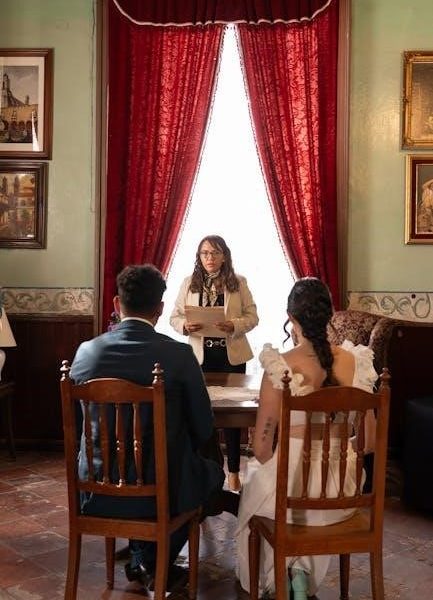
wedding officiant questionnaire pdf
A wedding officiant questionnaire is a comprehensive tool designed to gather essential details about the ceremony, ensuring a personalized and smooth experience. It helps officiants understand the couple’s vision, preferences, and legal requirements, streamlining communication and preparation for the big day.
Understanding the Purpose and Importance
A wedding officiant questionnaire serves as a crucial tool for ensuring a smooth and personalized ceremony. Its primary purpose is to gather detailed information about the couple’s preferences, legal requirements, and logistical needs. By understanding the couple’s vision, the officiant can craft a meaningful and tailored ceremony that reflects their unique story and values. This document also helps identify any special requests, such as custom vows, readings, or cultural traditions, ensuring they are seamlessly incorporated. Additionally, it streamlines communication, reducing misunderstandings and allowing the officiant to focus on delivering a memorable experience. The questionnaire is essential for both the couple and the officiant, as it lays the foundation for a well-organized and heartfelt celebration. Its importance lies in its ability to transform a standard ceremony into a truly personalized and unforgettable event.
Key Sections of the Wedding Officiant Questionnaire
A wedding officiant questionnaire typically includes sections on personal details, ceremony structure, vows, music, logistics, legal requirements, special requests, and contact information to ensure a smooth and personalized ceremony.
Personal Details of the Couple
The personal details section of the wedding officiant questionnaire collects essential information about the couple, including their full names, contact information, and relationship status. This section also asks for the wedding date, time, and location, as well as the names of witnesses and any relevant family members. Additionally, it may inquire about the couple’s marital history, such as previous marriages or divorces, to ensure all legal requirements are met. This section is crucial for tailoring the ceremony to the couple’s unique story and preferences. By gathering this information upfront, the officiant can prepare a personalized and meaningful ceremony. It also helps in verifying legal documentation and ensuring compliance with local marriage laws. Accurate and complete personal details are vital for a smooth and legally binding ceremony. This section lays the foundation for a well-organized and heartfelt wedding celebration.
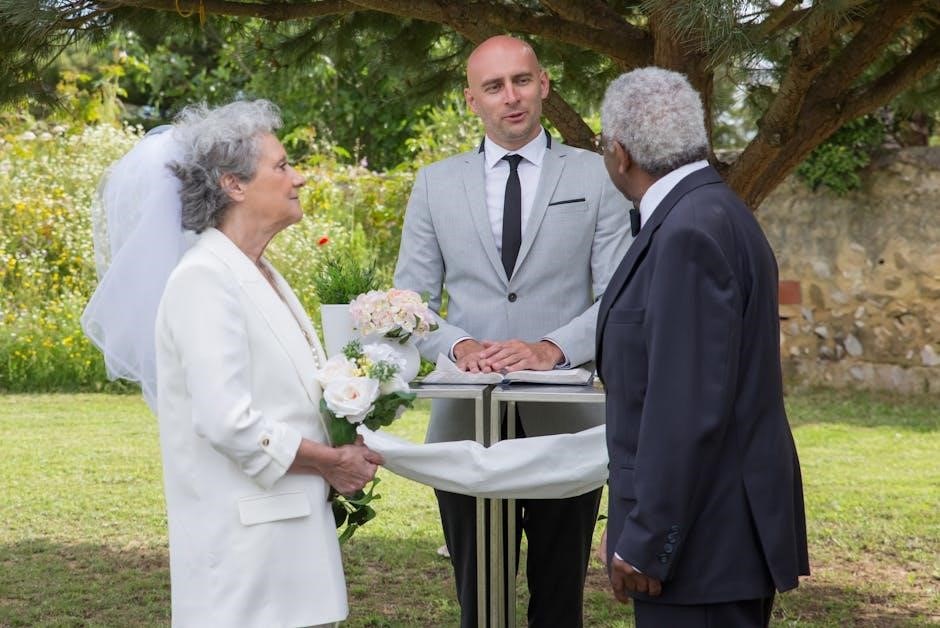
Ceremony Structure and Order of Events
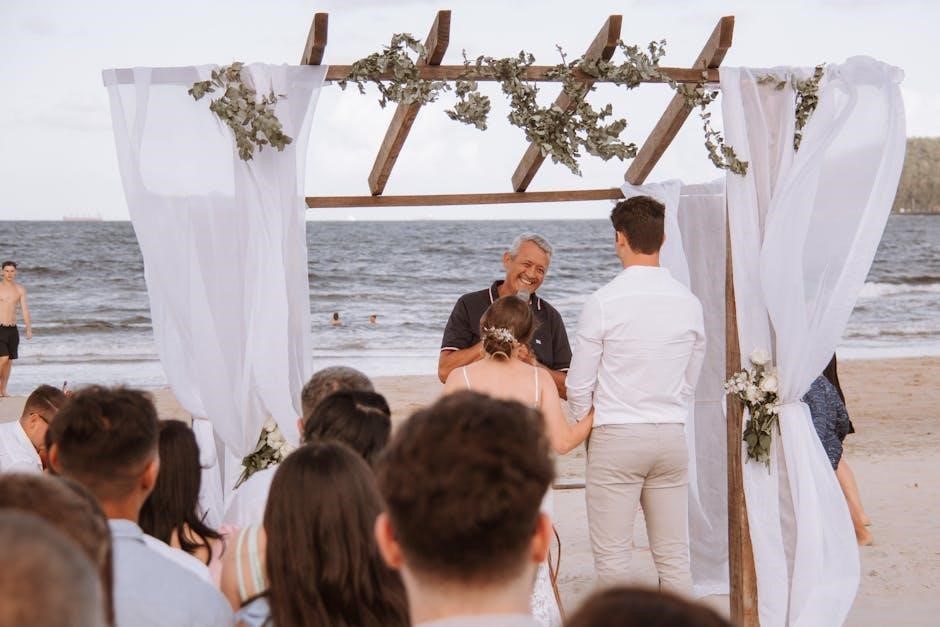
This section of the wedding officiant questionnaire focuses on the flow and sequence of the ceremony, ensuring a cohesive and meaningful experience. It typically includes questions about the overall structure, such as the processional, opening remarks, readings, vows, ring exchange, pronouncement, and recessional. Couples may also specify the order of events, including any cultural or personal traditions they wish to incorporate. Additionally, this section might ask about the involvement of guests, such as participation in readings, prayers, or special rituals. By outlining the ceremony structure in detail, the officiant can ensure a smooth progression of events, allowing the couple to focus on the significance of the moment. This section also helps the officiant prepare any necessary scripts or cues, ensuring the ceremony aligns with the couple’s vision and preferences. A well-defined order of events is essential for creating a memorable and heartfelt celebration. Proper planning in this area minimizes the risk of last-minute complications.
Wedding Vows and Readings
This section of the wedding officiant questionnaire delves into the personal and emotional aspects of the ceremony, focusing on the vows and readings. Couples are often asked to provide their vows in advance, whether they are writing their own or using traditional or ceremonial vows. The questionnaire may also inquire about specific readings, poems, or passages they wish to include, along with who will deliver them—whether a guest, family member, or the officiant. This section helps ensure the vows and readings align with the overall tone and theme of the ceremony, creating a meaningful and heartfelt experience. Additionally, couples may specify if they want to include unity readings or special rituals, such as a love letter exchange or a candle-lighting ceremony. By gathering this information, the officiant can seamlessly integrate these elements into the ceremony script, making the event truly personalized and memorable. Proper preparation in this area ensures the vows and readings are delivered with authenticity and emotional impact.
Music and Audio Requirements
The music and audio section of the wedding officiant questionnaire ensures that the ceremony’s soundtrack is perfectly aligned with the couple’s preferences. This part typically asks for the selection of processional, recessional, and any interlude music, as well as specific songs for special moments like a unity candle or sand ceremony. Couples may also specify if they prefer live music, such as a string quartet or solo instrumentalist, or pre-recorded tracks. Additionally, the questionnaire may inquire about audio equipment needs, like microphones or speakers, to ensure all guests can hear the vows and readings clearly. Some couples might request silence during certain parts or have specific audio cues for transitions. By detailing these preferences, the officiant can coordinate with musicians and venue staff to create a harmonious and emotionally resonant atmosphere. This section is crucial for setting the tone and ensuring the ceremony flows smoothly from start to finish.
Ceremony Logistics and Timing
The ceremony logistics and timing section of the wedding officiant questionnaire is vital for ensuring a well-organized and punctual event. This part typically asks for the exact venue location, including the address and any specific room or area where the ceremony will take place. Couples are also prompted to provide the start and end times of the ceremony, as well as the schedule for key moments, such as the processional, vows, and pronouncement. Details about the setup, like the arrangement of chairs or the placement of an altar, may be included to help the officiant visualize the space. Additionally, this section might inquire about the arrival times for the officiant, wedding party, and guests, ensuring everyone is in place before the ceremony begins. Some questionnaires also ask about parking and accessibility for the officiant and attendees. By gathering this information, the officiant can coordinate smoothly with vendors and participants, ensuring the ceremony unfolds seamlessly and on schedule. This attention to detail helps create a stress-free environment for the couple and their guests.
Legal Requirements and Documentation
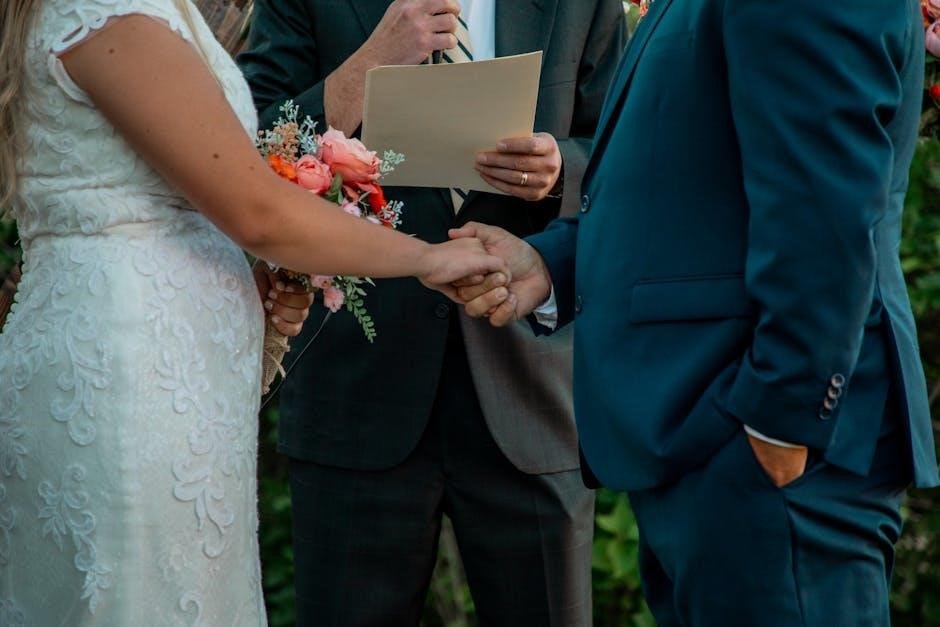
This section of the wedding officiant questionnaire focuses on ensuring all legal aspects of the ceremony are properly addressed. It typically includes questions about the couple’s marriage license, such as the issuing state or country, the date it was obtained, and the deadline for submission. The questionnaire may also ask for details regarding the officiant’s legal authority to perform the ceremony, such as their ordination credentials or certification. Some questionnaires include spaces for the couple to provide witness information, as many states require witnesses to sign the marriage license. Additionally, this section might inquire about any specific legal requirements or documentation needed for civil or religious ceremonies, such as blood tests or premarital counseling certificates. By gathering this information, the officiant can ensure the ceremony complies with all legal standards, making the marriage officially recognized. This step is crucial for a valid and legally binding union, providing peace of mind for the couple.
Special Requests and Personalized Elements
This section of the wedding officiant questionnaire allows couples to share unique or personal elements they wish to incorporate into the ceremony. It might include questions about specific rituals, such as a unity candle, handfasting, or sand ceremony, that hold special meaning for the couple. Additionally, it could ask about cultural or religious traditions they want to observe, ensuring the ceremony reflects their heritage or beliefs. Couples may also use this section to request personalized vows, readings, or prayers, or to specify any symbolic gestures they want to include. Some questionnaires may inquire about the involvement of family members or friends in the ceremony, such as having a loved one officiate a portion of the service or perform a reading. By gathering this information, the officiant can craft a ceremony that feels deeply personal and meaningful to the couple, making their wedding truly one-of-a-kind and memorable. This section ensures every detail aligns with their vision and story.
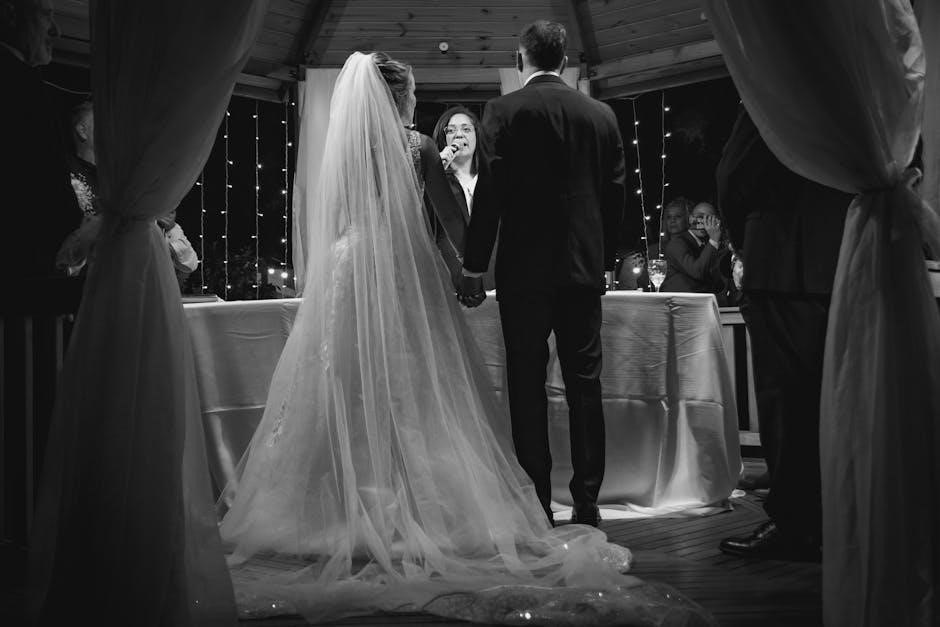
Contact Information and Communication Preferences

This section of the wedding officiant questionnaire collects essential contact details and communication preferences to ensure seamless coordination. Couples are typically asked to provide their full names, phone numbers, email addresses, and physical mailing addresses. They may also be requested to share the contact information of their wedding planner, venue coordinator, or other key vendors to facilitate collaboration. Additionally, this section might inquire about preferred communication methods, such as email, phone calls, or text messages, and the best times to reach them. Some questionnaires may also ask about secondary contacts, such as a trusted friend or family member, who can serve as a point of contact in case of an emergency. By gathering this information, the officiant can ensure timely updates, confirm logistics, and maintain open lines of communication leading up to the wedding day. This helps build trust and ensures everyone is well-prepared for the ceremony.

Creating a Comprehensive Wedding Officiant Questionnaire
A comprehensive wedding officiant questionnaire is essential for gathering all necessary details, ensuring a smooth and personalized ceremony. It should be well-organized, clear, and thorough, covering all aspects from logistics to personal preferences.
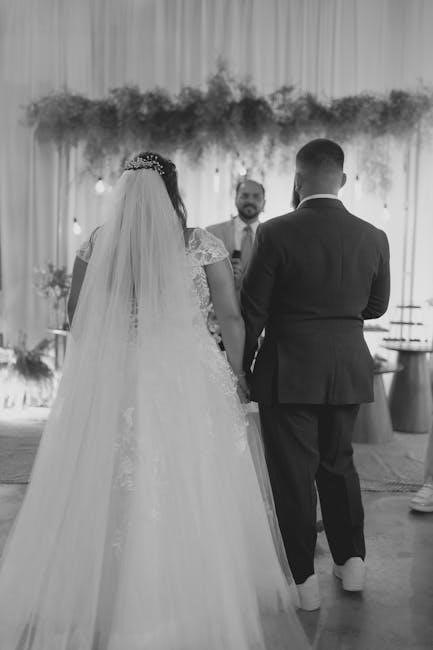
Ensuring All Necessary Information is Included
Ensuring all necessary information is included in a wedding officiant questionnaire is crucial for a seamless ceremony. It should cover personal details of the couple, ceremony structure, vows, readings, music, logistics, legal requirements, and special requests. Including sections for contact information and communication preferences ensures effective planning. The questionnaire should also allow space for personalized elements, making the ceremony unique and meaningful. By gathering all details upfront, the officiant can prepare thoroughly, minimizing last-minute issues. A well-organized questionnaire helps in understanding the couple’s vision and preferences, allowing the officiant to craft a ceremony that truly reflects their love story. It’s essential to review and update the questionnaire regularly to ensure accuracy and completeness, providing a stress-free experience for both the couple and the officiant.
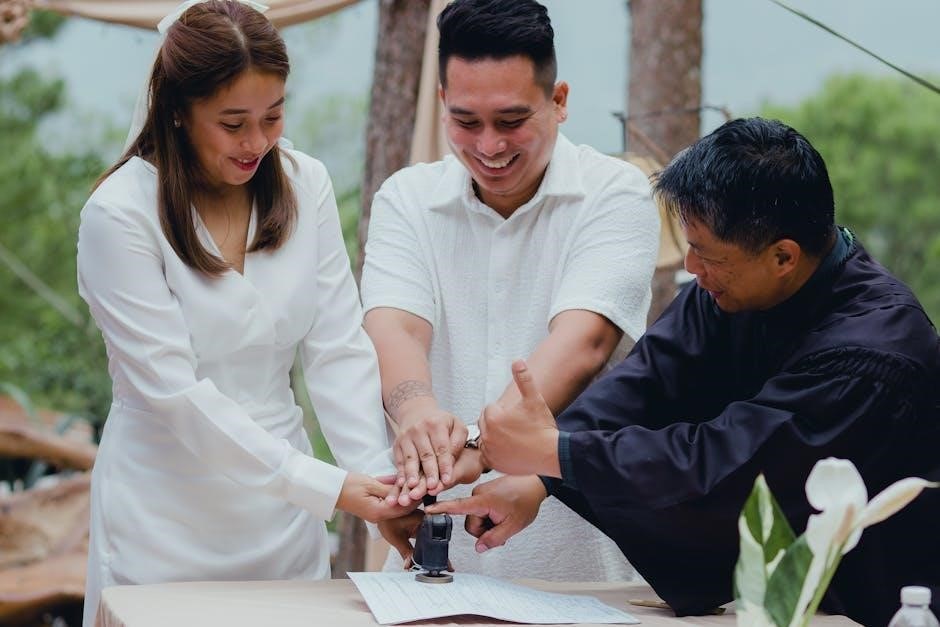
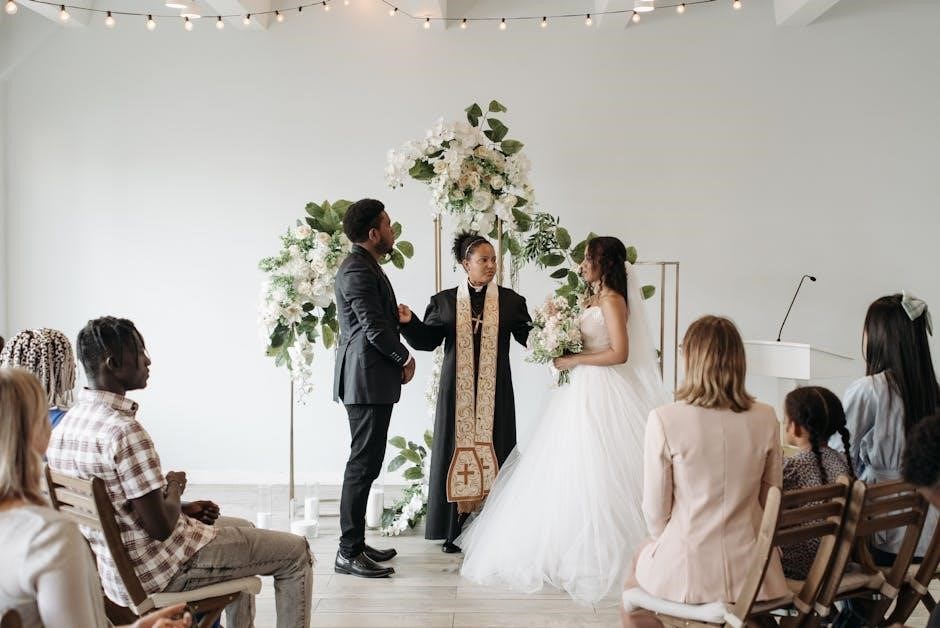
Final Thoughts on the Wedding Officiant Questionnaire
A well-crafted wedding officiant questionnaire ensures a smooth, personalized ceremony, allowing the officiant to deliver a meaningful experience tailored to the couple’s vision and preferences, making the day truly unforgettable.
Importance of Detailed Planning for a Smooth Ceremony
Detailed planning is crucial for a seamless wedding ceremony. A thorough wedding officiant questionnaire ensures that all aspects, from vows to logistics, are meticulously organized. This preparation minimizes last-minute issues, allowing the officiant to focus on delivering a heartfelt and personalized experience. By gathering essential information upfront, couples can ensure their vision is accurately reflected, creating a memorable and stress-free celebration. Proper planning also fosters clear communication between the couple and the officiant, aligning expectations and ensuring every detail is executed flawlessly; Ultimately, detailed planning transforms a wedding ceremony into a beautiful, unforgettable event that honors the couple’s love and commitment.
Leave a Reply
You must be logged in to post a comment.